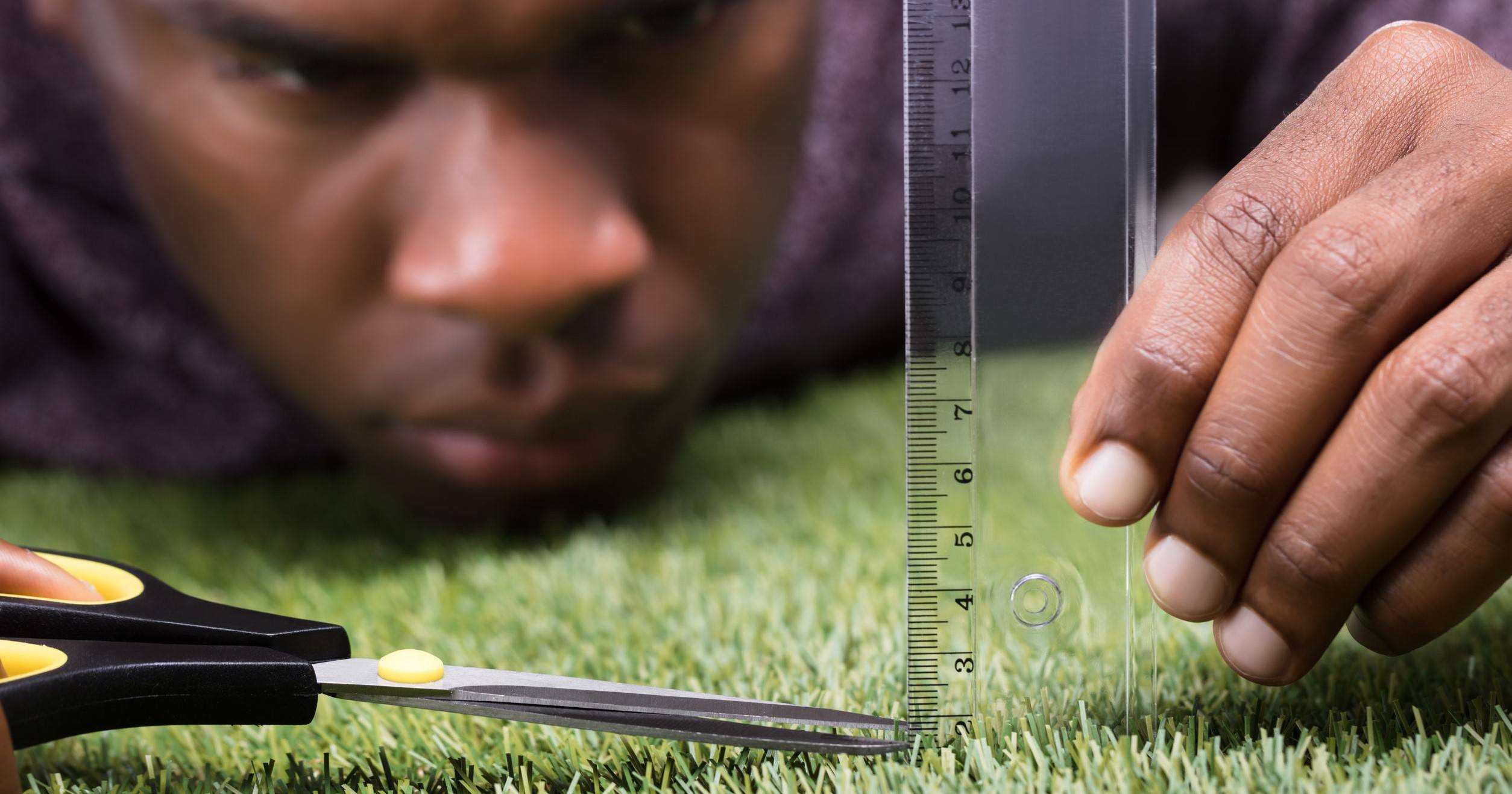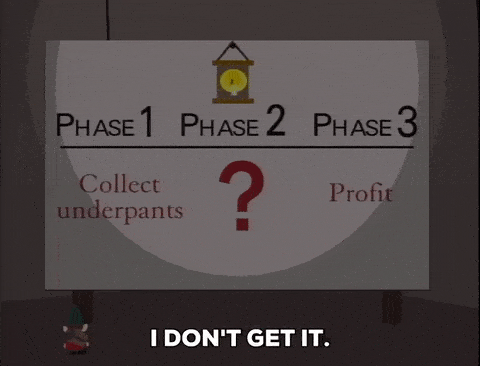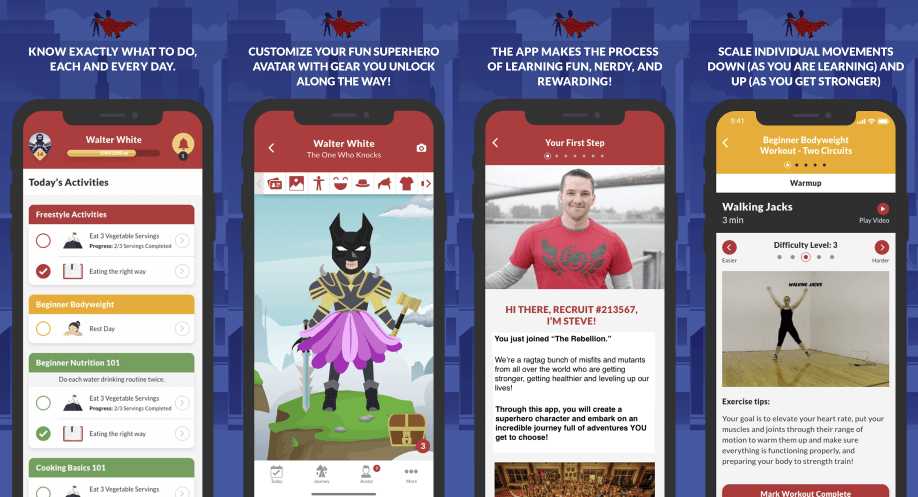5 Strategies for Overcoming Imposter Syndrome (to Get in Shape)

Maybe you’ve felt this way: it’s only a matter of time before someone bursts through the door shouting “fake!”
Then, they’ll have you hauled off to jail as a fraud…or ejected into space as an imposter:

Well, feeling like a phony is a real thing and we’ve found it to be fairly common amongst our coaching clients.
Luckily, we’ve learned a few strategies for overcoming “imposter syndrome,” especially on how it relates to fitness. Today, we’ll share our tips and tricks with you too.
Here’s what we’ll cover today:
- What is Imposter Syndrome?
- How to Overcome Imposter Syndrome Part 1: The Perfectionist
- How to Overcome Imposter Syndrome Part 2: The Superwoman/Superman
- How to Overcome Imposter Syndrome Part 3: The Natural Genius
- How to Overcome Imposter Syndrome Part 4: The Soloist
- How to Overcome Imposter Syndrome Part 5: The Expert
- Getting Rid of Imposter Syndrome (Next Steps)
What is Imposter Syndrome?

Imposter syndrome exists when a person doubts their skills, talents, or accomplishments, despite external evidence of their competence.
Those who suffer from imposter syndrome feel as though they do not deserve all that they have achieved, and instead incorrectly attribute their success to a combination of luck and deceit.
There is also generally a persistent fear of being seen as a “fraud,” that someone, somewhere, will uncover them for what they truly are.

That’s imposter syndrome.
If you’ve ever felt like you don’t deserve your job or accomplishments, you’re not alone. It’s been estimated that 70% of the general population (evenly split between men and women) have felt the effects of imposter syndrome at some point.[1]
Dr. Valerie Young, an expert on imposter syndrome, states:[2]
Impostor syndrome goes beyond a mere lack of confidence. People who feel like impostors hold themselves to an unrealistic and unsustainable standard of competence. Falling short of this standard then evokes shame.
Yeah, not good.

How do we get like this?
Well, it differs depending on the person, but there are some similarities to be found.
Dr. Young identifies five common characteristics of people who generally feel like a phony, despite the evidence to the contrary.
The five types of imposters are:
- The Perfectionist
- The Expert
- The Soloist
- The Natural Genius
- The Superwoman/Superman
It’ll be important for us to understand each of these, so we can determine some tools and strategies for overcoming them.
So let’s tackle each of these five types of self-diagnosed “imposters” and how it can relate to your fitness journey.
How to Overcome Imposter Syndrome Part 1: The Perfectionist

What’s going on with the Perfectionist?
The Perfectionist feels like the work they do must be 100% perfect, 100% of the time.
They set insanely high goals for themselves, which often prove unattainable.
Even when the Perfectionist HAS clearly succeeded at a task, they often feel that they should have done better. Then self-doubt creeps in.
There are some pros and cons here:
- On the one hand, it’s good to have high goals. This shows a lot of internal motivation.
- On the other hand, if the goals are so high that they mentally cripple you, then they’re not serving you well.
How’s this related to fitness?
The Perfectionist will often have an “all or nothing” approach. If they can’t get an hour workout in, then they’re not going to even bother with it.

This isn’t good, because the “perfect” time to workout rarely happens.
What to do instead?
Change your expectations around fitness.
Yeah, an hour workout would be great. But even just a five-minute workout is better than “no workout.”
As Theodore Roosevelt put it:
Do what you can, with what you have, where you are.
With that in mind, here’s a simple 5-minute routine you can do:
- Minute #1: 20 seconds of push-ups, 10 seconds of rest, 20 seconds of push-ups, 10 seconds of rest.
- Minute #2: 20 seconds of squats, 10 seconds of rest, 20 seconds of squats, 10 seconds of rest.
- Minute #3: Plank for as long as you can, then rest until the end of the minute.
- Minute #4: 20 seconds of lunges, 10 seconds of rest, 20 seconds of lunges, 10 seconds of rest.
- Minute #5: 20 seconds of push-ups, 10 seconds of rest, 20 seconds of push-ups, 10 seconds of rest. (unless you have access to pull-up bar or alternative, then do pull-ups)
If that seems too easy, you can also look into doing a Tabata Workout, which will have you doing High-Intensity Interval Training in just a few minutes.
The important thing here is to embrace “good enough.”
How to Overcome Imposter Syndrome Part 2: The Superwoman/Superman

What’s going on with the Superwoman/Superman?
The Superwoman/Superman feels like they should excel in every role they take.
- Great spouse? Check.
- Mother/Father of the year? You bet!
- Amazing colleague? Guess who’s clocking in overtime!
The Superwoman/Superman is addicted to this validation, thus they are externally motivated.
Again, we have some pros and cons:
- On the one hand, it’s great they want to contribute to the team.
- On the other hand, if there’s no one around to praise them, things might not get done.
How’s this related to fitness?
The Superwoman/Superman often needs an outside event to prepare for, like a 5K. Or maybe they want to get in shape for a wedding or a reunion.

Without such an event, they might not feel validated enough to get to work.
What to do instead?
External motivation is a great kickstart, but look to build internal motivation by doing something even if no one else knows about it. Do the task for its own sake.
To build internal motivation, ask yourself: how do you feel before, during, and after a workout?
By constantly reminding yourself of the positive feelings, you can help build internal motivation. This strategy can help wean you away from exclusively being driven by external forces.
How to Overcome Imposter Syndrome Part 3: The Natural Genius

What’s going on with the Natural Genius?
The Natural Genius feels that everything in life should come easy to them. They judge their competence based on the ease and speed of their efforts.
If it takes them a long time to master a task, they just assume they suck. Then they start to feel shame.
Some pros and cons of the Natural Genius:
- On the one hand, it’s awesome to have a lot of success in various aspects of life. There’s nothing to feel guilty about!
- On the other hand, this feeling of shame might stop you from growing in new areas.
How’s this related to fitness?
If the Natural Genius isn’t instantly good at something, they push it aside:
- I can’t bend like that, so I’m throwing away the yoga mat.
- I never catch anything, so I’m quitting Ultimate Frisbee.
- Everyone is faster than me, so I’m not showing up to the 5K.
What to do instead?
Remember, being bad at something is the first step to being ok at something.
Or…

To help here, look for evidence of something else in your life that was hard – but you pushed through and accomplished it anyway.
It could be something big, like graduating from college, or small, like building a birdhouse.
The important thing to ask: How did you feel after that?
Also, understand that the work is necessary. You’re never going to be good at EVERYTHING. Instead, enjoy the process and the learning curve ahead!
How to Overcome Imposter Syndrome Part 4: The Soloist

What’s going on with the Soloist?
The Soloist believes they have to do everything themselves.
If anyone ever gives them any assistance, it’s a fail, because now they can’t take any credit for the success.
Even if the Soloist finds themselves in trouble, they won’t reach out, preferring to struggle alone.
You’ll often hear the Soloist say things like “I don’t need anyone’s help.”
Like all our “imposters,” there are some pros and cons here:
- On the one hand, it’s great to want to be self-sufficient
- On the other hand, this may cause unnecessary stress.
How’s this related to fitness?
If the Soloist runs into any health or fitness struggle, they often shut down communication around the topic.
Ironically, we see this from time to time in our 1-on-1 Online Coaching Program. A client will be doing great, kicking-ass with their workouts and nutrition, and they’ll communicate daily with their coach. But the second they run into any snags, they disappear, almost as if…

What to do instead?
Recognize when you feel like going into “hermit mode” and proactively reach out to others!
Truth be told, the best time to do this is actually before you run into trouble.
Look, things will come up:
- Work will turn insane.
- A tire will go flat.
- Your kid will get sick.
One of the best things you can do when struggling (in fitness or anywhere) is to reach out to someone.
- One, they might have some advice.
- Two, even just an open ear can be helpful when things aren’t so good.
That’s why we actually encourage everyone who joins Nerd Fitness Prime to reach out to our private Facebook or Discord group. Everyone in there is on a similar journey, so when things go bad, the community can relate.
Someone there might even know what to do.
Whether through the Nerd Fitness Rebellion, work, or some other group, finding an “accountabuddy” can be really helpful when trying to get in shape.
Look around and if you see somebody who’s also on a similar path, say “Hey, let’s do this together!!!”
How to Overcome Imposter Syndrome Part 5: The Expert

What’s going on with the Expert?
The Expert defines themselves by what or how much they know.
Believing they’ll look foolish if they don’t know something, they’ll seek out more information. And more. The Expert endlessly researches a topic, always needing to absorb more.
Also, somewhat ironically, the Expert does not view themselves as an “expert,” instead they choose to remind themselves of their ignorance.
Again, there are strengths and weaknesses here:
- On the one hand, being curious is awesome.
- On the other hand, constantly searching for more information can be a form of procrastination.
Or as Morpheus teaches Neo:

How’s this related to fitness?
We actually have a term for this around Nerd Fitness: Underpants Collector.
It’s from a South Park episode, where the Underpants Gnomes steal people’s underwear to gain “profit.”
The trouble is, they don’t know what to actually do with all the underwear they’ve thieved.

This makes somewhat more sense if you watch the episode. Somewhat.
The morale of our South Park tangent: be careful of gathering a bunch of information and then not doing anything with it.
Trying and failing and learning from previous mistakes is more valuable than spending additional time researching, then not attempting anything.
What to do instead?
Here’s another term we throw around Nerd Fitness: Use 20 Seconds of Courage.
It’s tough, but if you can suck it up and pull the trigger to act, the momentum from that initial decision will propel you forward.
Yes, it’s scary to act and less scary to read more. But acting is what will truly make you an expert.
Getting Rid of Imposter Syndrome (Next Steps)

Perhaps you’ve seen yourself in one of these “imposter” subgroups.
It could be in your fitness and non-fitness related words and actions.
As we covered, each “imposter” comes with certain strengths. But there are also weaknesses.
If you find yourself feeling like a fraud, try one of the strategies we covered today:
- Reevaluate your expectations around “perfect.”
- Search for internal motivation around the work you need to do.
- Remember that it’s okay to “suck” at things now and then.
- If you run into trouble, it’s okay to reach out for help.
- Ask yourself if you really need to read another internet article, or is it time to act.
If you need help acting, I have three next steps for you.
Next Step #1) Our Online Coaching Program: if you find yourself struggling as the Soloist, maybe it’s time to ask for help.
You can schedule a free call with our team so we can get to know you and see if our coaching program is right for you. Just click on the image below for more details:
Next Step Number #2) If you need a trigger to get you to “act,” check out NF Journey. Our fun habit-building app helps you exercise more frequently, eat healthier, and level up your life (literally).

You gain access to this app through Nerd Fitness Prime.
Next Step Number #3) Join the Rebellion! We need good people like you in our community, the Nerd Fitness Rebellion. It’s the best place to find an accountabuddy.
Sign up in the box below to enlist and get our Rebel Starter Kit, which includes all of our “work out at home” guides, the Nerd Fitness Diet Cheat Sheet, and much more!
- The 15 mistakes you don’t want to make.
- Full guide to the most effective diet and why it works.
- Complete and track your first workout today, no gym required.
Alright, I want to hear from you:
Do you occasionally see yourself as an imposter or fraud?
Which one of the subgroups do you recognize in yourself?
Any tips or tricks for overcoming imposter syndrome?
Let me know in the comments!
-Steve
PS: Props to Dr. Valerie Young for helping people overcome imposter syndrome. Young is doing good things in the world.
###
Photo source: Among Us, Clean Room, Andriy Popov © 123RF.com, Maxim Maksutov © 123RF.com, bennymarty © 123RF.com, sunset, Roosevelt quote.
from Nerd Fitness https://ift.tt/3lzqPK0
0 comments:
Post a Comment